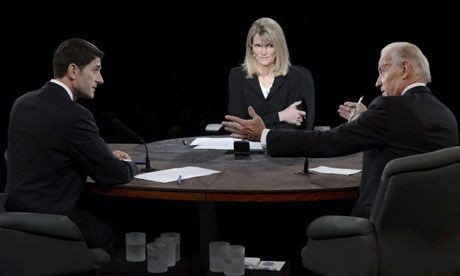Martha Raddatz’s Wild Card: What The VP Moderator Learned From Jim Lehrer

It turns out, Jim Lehrer was wrong. It is about the moderator.
The pundit-fueled commentary following Thursday night’s vice-presidential debate between Joe Biden and Paul Ryan took a very different tone than the collective squawking we heard in response to Lehrer’s lackluster performance last week.
Martha Raddatz, the ABC News (NYSE: DIS) senior foreign correspondent who presided over the evening with grace and firmness, was widely praised for her assertiveness and her keen attention to specifics. The acclaim was a far cry from the brutal flogging Jim Lehrer received after he lumbered his way through the presidential debate between Barack Obama and Mitt Romney on Oct. 3.
What’s interesting is that the Commission on Presidential Debates has publicly praised Lehrer’s hands-off approach, saying it was part of an untested format to allow the candidates to interact more directly with each other. As such, Raddatz was under pressure to balance the line between respecting the commission’s wishes -- thereby appearing more Lehrer-like -- and at the same time not losing control of the situation, as many pundits and tweeters felt Lehrer did.
Couple this challenge with having to play referee between two very different personalities -- Biden, who was passionate, arrogant and larger-than-life, versus Ryan, who was meek and squeaky -- and Raddatz’s ability to retain order seems all the more impressive.
The difference between Lehrer’s and Raddatz’s styles may simply reflect the difference in their backgrounds. Lehrer, a respected news doyen on the notably low-key PBS network, has made a career out of staying even-tempered and impartial in the face of flying opinions. Raddatz, in contrast, spent years as an ABC front-liner reporting from the trenches of Iraq and the gutters of the White House. You don’t spar with George W. Bush’s press secretaries for four years without learning to lob a curve ball or two, and toward the end of the debate last night, that’s just what Raddatz did:
“I would like to ask you both to tell me what role your religion has played in your own personal views on abortion,” Raddatz asked. “And, please, this is such an emotional issue for so many people in this country. Please talk personally about this, if you could.”
With that question, Raddatz’s purpose was clear: She was no longer going to tiptoe around the polarizing social issues that had hitherto been avoided at both debates. Lehrer, as we recall, kept his domestic discussions largely focused on the economy and taxes -- two vital issues, for sure, but so dependent on esoteric statistics that the candidates’ responses came off like an algebra lecture on a Friday afternoon, and even the president looked as if he was having a hard time staying awake.
Conversely, social issues offer a much sharper picture of the values that divide the country, and by focusing on the abortion issue, Raddatz forced the candidates to drop their guard, put down their notes and reveal where they stand on difficult but fundamental questions: Where does life begin? Does a woman’s right to choose outweigh the rights of an unborn fetus?
Raddatz’s question, of course, drew its share of controversy. (MSNBC’s Lawrence O’Donnell blasted her for it, saying the question of religion has no business in government.) Nevertheless, the question served its purpose in that it revealed a salient difference between the ideologies of the two men, both practicing Catholics. While they both said they believe life begins at conception, it was Biden who made it clear that he would not impose those beliefs on all Americans. Ryan, on the other hand, said a Romney/Ryan ticket opposes abortion except in the case of rape, incest or when the life of the mother is at risk. Such is the clear line in the sand that Raddatz forced the candidates to draw.
Following the backlash over his moderating performance earlier this month, Jim Lehrer said in an interview with Politico that “it’s not my job to control the conversation.”
That explanation made sense at the time, but Raddatz’s authoritative immediacy on Thursday might have a lot of people rethinking it.
© Copyright IBTimes 2025. All rights reserved.






















